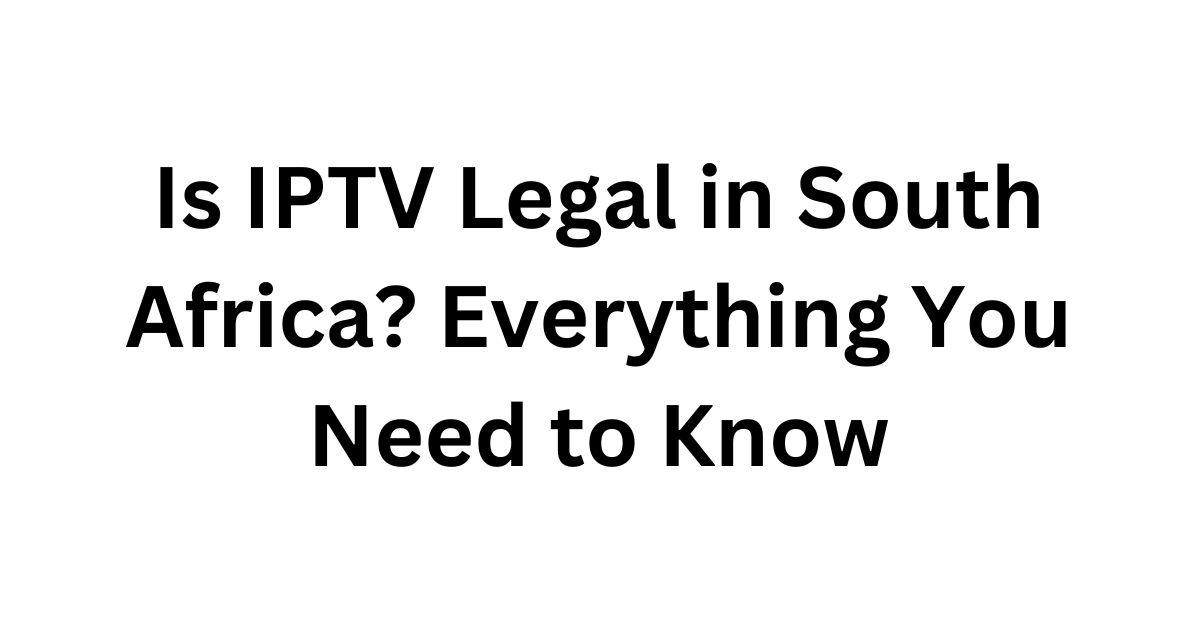IPTV, short for Internet Protocol Television, has revolutionized how we consume entertainment. Instead of relying on traditional cable or satellite TV services, IPTV allows users to stream live television, movies, and other media over the internet. The demand for IPTV services in South Africa has grown significantly due to its affordability and flexibility.
However, as the popularity of IPTV increases, so do questions about its legality. Many people are unaware of the regulations governing IPTV services in South Africa. Is your favorite streaming service legal? Are you unknowingly putting yourself at risk? This article will explore these questions in detail to help you make informed decisions.
What is IPTV?
IPTV, or Internet Protocol Television, refers to the delivery of television content over the internet. Unlike traditional methods that rely on satellite or cable, IPTV uses the internet protocol to stream video content.
Types of IPTV Services
-
Live IPTV: This involves streaming live TV channels as they broadcast in real time. Examples include sports events, news, and entertainment channels.
-
Video on Demand (VOD): This allows users to choose from a library of movies, shows, and other content to watch at their convenience.
-
Time-Shifted Media: This feature enables users to watch previously aired content, providing greater flexibility in viewing schedules.
Benefits of IPTV
-
Wide range of content, including global and local channels.
-
On-demand access to movies and shows.
-
Cost-effective compared to traditional TV services.
-
Compatibility with multiple devices, including smart TVs, smartphones, and computers.
Legal Framework Governing IPTV in South Africa
The legality of IPTV services in South Africa is determined by existing laws that regulate broadcasting and copyright. Two key legislations provide the framework for this:
Relevant Laws
-
The Copyright Act 98 of 1978:
-
Protects the intellectual property rights of content creators.
-
Requires service providers to obtain licenses for distributing copyrighted content.
-
-
The Electronic Communications Act 36 of 2005:
-
Regulates broadcasting, telecommunications, and broadcasting signal distribution.
-
Ensures that IPTV providers operate within legal boundaries.
-
Implications
-
IPTV providers must acquire licenses to distribute content legally.
-
Users who consume content from unlicensed providers may face penalties under copyright infringement laws.
Legal IPTV Services in South Africa
Characteristics of Legal Providers
Legal IPTV providers:
-
Have proper licensing agreements with content creators.
-
Operate transparently and adhere to local and international laws.
-
Offer secure payment options and reliable customer support.
Examples of Legal IPTV Services
-
Showmax: A popular streaming service offering a mix of local and international content.
-
DStv Now: Provides live TV and on-demand content for DStv subscribers.
-
Other reputable services that comply with copyright laws.
By choosing legal providers, users can enjoy high-quality streaming without the risk of legal consequences.
Risks of Using Illegal IPTV Services
While illegal IPTV services may appear attractive due to their low costs and extensive content libraries, they come with significant risks.
Identifying Illegal IPTV Providers
-
Offer content without proper licensing agreements.
-
Operate under obscure or hidden terms.
-
Charge suspiciously low subscription fees.
Legal Consequences
-
Users may face fines or penalties for accessing unauthorized content.
-
Providers of illegal IPTV services risk imprisonment and hefty fines.
Impact on the Entertainment Industry
-
Revenue loss for content creators and distributors.
-
Reduced investment in local and international productions.
-
Undermines the overall economy by promoting illegal activities.
How to Ensure Legal IPTV Usage
To enjoy IPTV services responsibly, follow these tips:
Identifying Legal Providers
-
Verify that the provider has proper licensing agreements.
-
Check reviews and the provider's reputation online.
-
Avoid services offering "too-good-to-be-true" pricing.
The Importance of Ethical Streaming
Using legal IPTV services ensures:
-
Support for content creators and the entertainment industry.
-
Access to reliable and high-quality streaming.
-
Peace of mind, knowing you're not violating any laws.
Comparison of IPTV Services in South Africa
Here's a quick comparison of popular legal IPTV services available in South Africa:
| Service | Features | Price Range | Content Library |
|---|---|---|---|
| Showmax | Local & international shows, movies | Affordable | Extensive, with local focus |
| DStv Now | Live TV, sports, on-demand | Subscription-based | Comprehensive and varied |
| Netflix | Global content, original series | Competitive pricing | Internationally renowned content |
Choosing a legal provider not only ensures compliance with laws but also guarantees a seamless viewing experience.
Conclusion
In South Africa, the legality of IPTV services depends on whether they comply with copyright and broadcasting regulations. By opting for licensed providers like Showmax or DStv Now, users can enjoy a wide range of content without legal concerns.
Streaming responsibly is not just about avoiding legal trouble—it's about supporting ethical practices and contributing to the growth of the entertainment industry. Make the right choice today!
FAQs
1. What is IPTV?
IPTV delivers television content via the internet instead of traditional satellite or cable methods.
2. Is IPTV legal in South Africa?
Yes, IPTV is legal if the provider complies with copyright and broadcasting regulations.
3. How can I ensure my IPTV provider is legal?
Verify licensing, read reviews, and avoid suspiciously low-priced services.
4. What are the risks of using illegal IPTV services?
Legal consequences include fines and imprisonment, along with poor service reliability.

